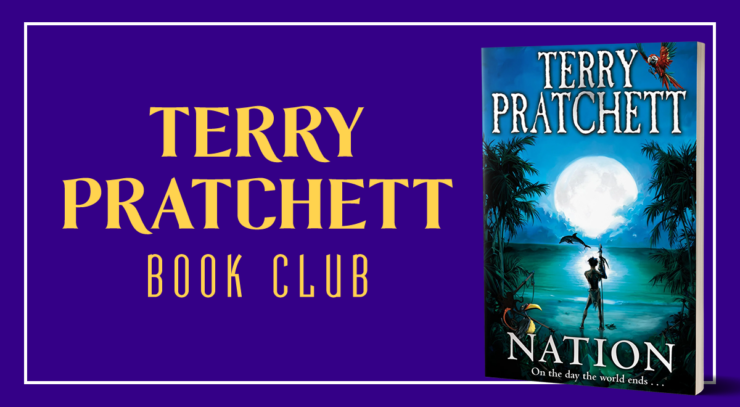We finally find out how to scare the shark away with a word. Well, it’s not a word, really. That’s the good bit.
Summary
Mau cooks yams and plantains in beer at the Women’s Place and brings that to a hog with babies so that he can get her drunk enough to take her milk for the baby. He has to do it again, and is not looking forward to it by any means, when another canoe shows up. In it are brothers Pilu and Milo; the latter’s wife, Cahle, is about to give birth. They’ve been searching the islands to find a proper place and people who know the rites. Mau tells them that Ataba will lead them to the Women’s Place and plans to send Daphne to help them. Ataba balks at this because she doesn’t know their ways, but Mau insists that there are no other options available to them. He goes to the Sweet Judy and manages to tell Daphne about the woman and the baby, but Daphne is horrified by the idea of having to help—she lost her mother in childbirth. She realizes that Mau has dealt with far worse and follows him. Pilu knows some English, and speaks to her, and Mau helps Daphne get Cahle into the Women’s Place. Daphne kicks Mau out of the hut and remembers that they said she needed to sing a song to welcome the baby. She begins to sing “Twinkle, Twinkle Little Star,” which calms Cahle down.
The men listen outside to the song Daphne sings, and Pilu translates best he can—they all believe it is a portentous song about a child who will be a guiding star, which they decide to name the child. Daphne tells the men to bring the Unknown Woman and her baby up to the hut to that the baby can be fed by Cahle. Two weeks pass, and Daphne is still helping the women, more people have arrived (an old woman and a boy named Oto-I), and Cahle has been carefully teaching Daphne the ways of their women so that she can find a husband, while the men strip the Sweet Judy down for its timber and tools. Pilu and Mau talk as they work and Mau asks if he’ll teach him more of the trouserman language so he can talk to Daphne. Pilu recommends that he wear a pair of salvaged trousers, since that’s very important to her people, and they discuss their strange ways. (Pilu and Milo lived among them very briefly and learned a few things.) Daphne gets a grass skirt to wear from the Unknown Woman while Mau tries on the trousers. Mau makes Pilu cry by continually questioning the existence of the gods and where Pilu’s people went, and then he hears the thundering of the grandfathers, only it’s much louder this time. He tells Pilu that they want him to bring up the last of the god anchors, the one for the god of Water.
Daphne makes the beer using a different song, and is encouraged to go to the beach. She and Mau see each other—her in the grass skirt, him in trousers—and the whole group laughs together. Milo spots sails and more people arrive. Now they number eleven women, eight men (not including Mau because he has no soul), and three dogs. These people believe that the final god anchor needs to be brought up to protect them. Mau tells them he will do it. The water god anchor will not nudge from the lagoon, however, stuck under a piece of coral. Mau tells Ataba that he thinks there’s a fourth god and it is a trouserman; he gathers Pilu and Milo to help him free the god anchor with trouserman tools. Mau tells them that there is another stone down there, and Ataba heads down to try and smash the new stone with a hammer, almost drowning. He jumps back in and hits the coral, bleeding, which calls a shark. Mau uses Nawi’s advice to scare the shark off (shouting at it) and they bring Ataba back to the shore. He knows the reason that the old man tried to smash the new stone—it had trouserman marks on it, and Mau thinks that the god anchors may have been made by them. Mau asks Ataba who made the god anchors, but the old man insists that Mau is wrong to ask, and that he won’t like the answers.
On the Cutty Wren, Mr. Black is informed about the tsunami and asked what they should do about finding the Sweet Judy. He decides to continue as their orders dictate and not veer off course to search the islands ahead of time. Daphne starts hearing voices of her own, but she’s unsure where they come from, or if she’s perhaps talking to herself. A voice tells her to go quickly and she finds Mau unresponsive—he appears to have succumbed to hypothermia and is comatose. Milo brings the two god anchors to shore despite Ataba being furious at the presence of the fourth. Pilu tells the story of how Mau saved Ataba from the shark and everyone is moved. Cahle believes that Mau is dying, but Daphne insists that he’s still there, so Cahle tells her to talk to the Sky Woman (the old woman Daphne has been calling Mrs. Gurgle in her head) because she is powerful and will know what to do. Mrs. Gurgle says Mau is caught in a shadow place between life and death, and Daphne volunteers to go get him. Mrs. Gurgle agrees to this, but says that the only way to get Daphne there is to poison her; she agrees. Mau is running from Locaha, who taunts him. Daphne arrives and pulls Mau in a different direction, toward life, though it is very hard to get back…
Buy the Book


Nation
Commentary
The philosophical musings just get deeper and gnarlier as we go, but it’s important that they’re being mused on in the wake of devastation. Because it’s different for Mau to make Pilu cry about the possibility of their gods and the afterlife being plumb made up when the young man is actively thinking of all the people he’s lost—which is everyone. And, pointedly, moments of active grief are often the only times people think of these things.
It makes Ataba’s smugness hard to swallow because when he tweaks at Mau about people needing their faith, it’s not really a fair argument. Faith is a thing that people often fall back on in the wake of tragedy and the book keeps pointing this out—the ways in which people bury themselves in tradition and dogma when they’re afraid because the brain doesn’t know how to make sense of larger tragedy. Ataba says they need it, but it’s more accurate to say that they simply can’t help it. The alternatives are too horrible. The alternative is feeling the way Mau feels, and he’s furious and miserable.
Daphne thinks this of Mau:
He seemed angry all the time, in the way that Grandmother got angry when she found out that Standards were not being Upheld.
And like… it’s genuinely the same thing. Standards not being Upheld isn’t really any different from Mau’s anger because they’re both anger at the same thing; The world being wrong. I dunno, it just seems important that you can draw that line between two people who couldn’t have less in common because that’s clearly what this book is about, on one level. Humanity loves to poke the “we’re not so different, you and I” button in a million different ways, but it’s always a little extra poignant when you can do it with two people like that.
As always, Pratchett says the quiet part out loud with regard to religion and people. For example, here are thoughts on god(s):
That’s what the gods are! An answer that will do!
And then on people:
It was a sacred place, and not because of some god or other. It was just… sacred, because it existed, because pain and blood and joy and death had echoed in time and made it so.
Gods are what you rely on when you need an answer and can’t find one. Which is frequently, to be fair. Even the most learned members of our species don’t know all that much. It’s one aspect of the more virulent strain of atheism that I can never get behind—religion isn’t surprising or pathetic, even if it’s not your thing. We continually ask “why?” and sometimes we find an answer. When we don’t, we’re all going to cope with that differently.
Conversely, Pratchett has both Daphne and Mau coming to terms with people being the point. People being really all there is. People making things sacred by feeling and existing in a place. Even with all the frustrations and difficulties they bring, the more people come to the island, the better Mau feels. Locaha can’t have him yet.
Asides and little thoughts
- The fictional rule about cannibal raiders is that once you bring them up, they have to appear, right? That’s what’s going to happen, right? The most obvious and loaded Chekov’s Gun.
- I do love the bit with Mau trying on the pants and Daphne trying on the grass skirt because it’s that sort of scene that’s always used as a precursor to romance in a way that can often feel kinda icky? (Especially in this case because they’re very young?) But here it’s just so dang wholesome and ends with everyone laughing and feeling human and normal together for a moment.
- The bit with needing to sing to the beer reminds me of something I read that talked about how people used to recite prayers/hymns/rhymes/etc daily as a form of timing; meaning, if you needed to bake bread, you knew how long to knead the dough based on how many times you should recite the Lord’s Prayer. I assume that’s what’s going on here, too.
Pratchettisms
Without them I would be just a figure on the grey beach, a lost boy, not knowing who I am. But they all know me. I matter to them, and that is who I am.
She felt better for all that. A good shouting at somebody always makes you feel better and in control, especially if you aren’t.
They looked up at the dawn sky. The last of the stars looked back, but twinkled in the wrong language.
People need time to deal with the now before it runs away and becomes the them. And what they need most of all is nothing much happening.
He’s frightened of me, Mau thought. I haven’t hit him or even raised my hand. I’ve just tried to make him think differently, and now he’s scared. Of thinking. It’s magic.
The newcomers seemed awkward about the chief who wasn’t a man, but a touch of demon got respect.
Normally people tended to be very quiet in the parish church. Perhaps they were afraid of waking God up in case He asked pointed questions or gave them a test.
Silence fell like a hammer made of feathers. It left holes in the shape of the sound of the sea.
Next week we’ll read Chapters 9-12!










